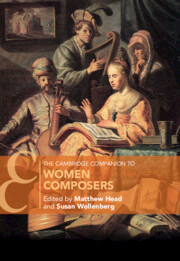Book contents
- The Cambridge Companion to Women Composers
- Cambridge Companions to Music
- The Cambridge Companion to Women Composers
- Copyright page
- Dedication
- Contents
- Figures
- Music Examples
- Contributors
- Acknowledgements
- Abbreviations
- Prologue
- Part I Themes in Studying Women Composers
- 1 Historical Women Composers and the Transience of Female Musical Fame
- 2 In Search of a Feminist Analysis
- 3 Composing Women’s History
- 4 Progress and Professionalism
- 5 Women Composers and Feminism
- Part II Highlighting Women Composers before 1750
- Part III Women Composers circa 1750–1880
- Part IV Women Composers circa 1880–2000
- Bibliography
- Index
- References
3 - Composing Women’s History
Beyond Suppression and Separate Spheres
from Part I - Themes in Studying Women Composers
Published online by Cambridge University Press: 23 May 2024
- The Cambridge Companion to Women Composers
- Cambridge Companions to Music
- The Cambridge Companion to Women Composers
- Copyright page
- Dedication
- Contents
- Figures
- Music Examples
- Contributors
- Acknowledgements
- Abbreviations
- Prologue
- Part I Themes in Studying Women Composers
- 1 Historical Women Composers and the Transience of Female Musical Fame
- 2 In Search of a Feminist Analysis
- 3 Composing Women’s History
- 4 Progress and Professionalism
- 5 Women Composers and Feminism
- Part II Highlighting Women Composers before 1750
- Part III Women Composers circa 1750–1880
- Part IV Women Composers circa 1880–2000
- Bibliography
- Index
- References
Summary
In her lecture ‘The public voice of women’, Mary Beard begins with Homer’s Odyssey and the ‘first recorded example of a man telling a woman to “shut up”’. Penelope, patient wife of adventuring Odysseus, requests that a bard sing happier tunes; her son, Telemachus, is not impressed. ‘“Mother”, he says, “go back up into your quarters, and take up your own work, the loom and the distaff … speech will be the business of men, all men, and of me most of all; for mine is the power in this household”’.1 With this moment, Beard highlights continuity between antiquity and the present, revealing the importance of female silencing to male identity. Telemachus, she observes, becomes a man by confining Penelope, setting her out of sight and hearing. Her silence amplifies his voice.
- Type
- Chapter
- Information
- The Cambridge Companion to Women Composers , pp. 50 - 62Publisher: Cambridge University PressPrint publication year: 2024

